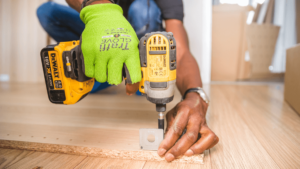Every good contractor knows the value of heavy equipment. It’s irreplaceable for efficiency on the construction site and delivering projects on time. So, to get your hands on quality equipment, you have two choices: buy or rent.
While buying new machinery might look appealing at first, most new construction businesses can’t afford it.
There are high upfront and ongoing costs such as maintenance, taxes, and insurance. Actually, these factors have driven even experienced contractors to look into renting heavy equipment.
And the rental industry prospered! The global equipment rental market is growing at a quick pace, and it’s expected to reach $140 billion by 2027. Just in the US, the equipment rental market was valued at $48.5 billion in 2020.
So, if you want the newest heavy equipment without the added financial commitment of ownership, then you should look into renting.
But before you make a final decision, you need to be aware of the benefits and drawbacks so you can make the right decision for your business.
In this article...
The Pros of Renting Construction Equipment
When you consider that you have a lower responsibility for the equipment you use and access to the best models on the market, renting becomes an easy decision.
Here are the main reasons so many contractors are contacting rental companies nowadays.
Lower Initial Investment
Financing heavy equipment is a serious concern for contractors. No matter which route you take (buying or renting), you’re going to have to spend money. But the price tags significantly differ whether you want to buy or rent.
First, let’s look at some numbers when it comes to buying heavy equipment.
Prices vary from manufacturer to manufacturer, but the average price for a new excavator is between $100,000 and $500,000.
Keep in mind that this doesn’t include added costs of buying attachments. This can force you to shell out an additional $5,000 up to $10,000.
Now you’re probably thinking: “Well, I can just buy good quality used equipment.” Unfortunately, that will not save you from a high initial investment. Even used equipment is heavily priced.
Ritchie Bros., an auction company for used heavy equipment, recently published a Market Trends Summary Report highlighting pricing trends for trucks and excavators.
According to their findings, the average price throughout 2020 for a used excavator was $50,000.
Now, let’s compare that to some average prices for renting heavy equipment.
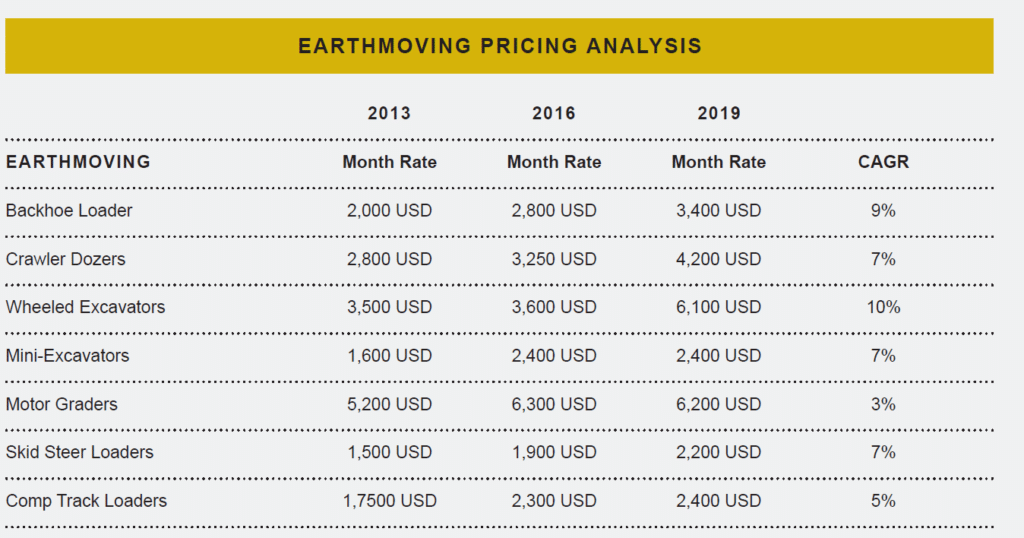
As you can see, the initial investment for renting heavy equipment is significantly lower than if you were to buy it.
If you’re just starting as a business, relying on renting equipment might be more financially sustainable than outright buying all the heavy machinery.
When you rent your equipment, there’s a fixed price that will make budgeting far easier. You’ll have to commit to small and regular payments during the rental period, making financial planning more organized.
Even better, if you’re not happy with the equipment, you can return it and don’t have to pay for it anymore.
In the end, if you can’t afford high upfront costs or you want to manage your heavy equipment expenses better, then your best option is to rent.
Free Equipment Maintenance
Maintaining equipment can become a hassle, even if you have an experienced maintenance team.
Checking fluids and hydraulics, then changing parts and upgrading technology–all of this can pose a serious problem financially and logistically for a construction company.
Unfortunately, equipment breakdowns are fairly common, but the machines must be regularly checked to comply with safety regulations. When you own your equipment, maintenance is an added responsibility.

With renting, you don’t have to worry about maintaining heavy machinery. Good rental companies include maintenance and insurance into their pricing, so they’ll handle everything for you when something goes wrong.
Rental companies will take your broken equipment and service it in-house, leaving you to worry about other tasks.
They own the machinery, so they need to keep it in pristine working condition to satisfy you as a client and to prolong the equipment’s lifespan.
If you want to avoid regular maintenance responsibility and costs, renting heavy equipment is your best solution.
Increased Flexibility
It’s not just the rising ownership costs that are changing contractors’ minds when it comes to acquiring new heavy equipment.
The construction industry is very dynamic, and fluctuations in the market heavily contributed to rising demands for equipment rentals.
Basically, it can be difficult to predict how a project will progress. You might find yourself needing different heavy equipment than what you already have.
For example, if you have tight access to a construction site that requires small equipment but only own large heavy machinery, you won’t be able to use them. And the most expensive equipment is the one that’s not being used.
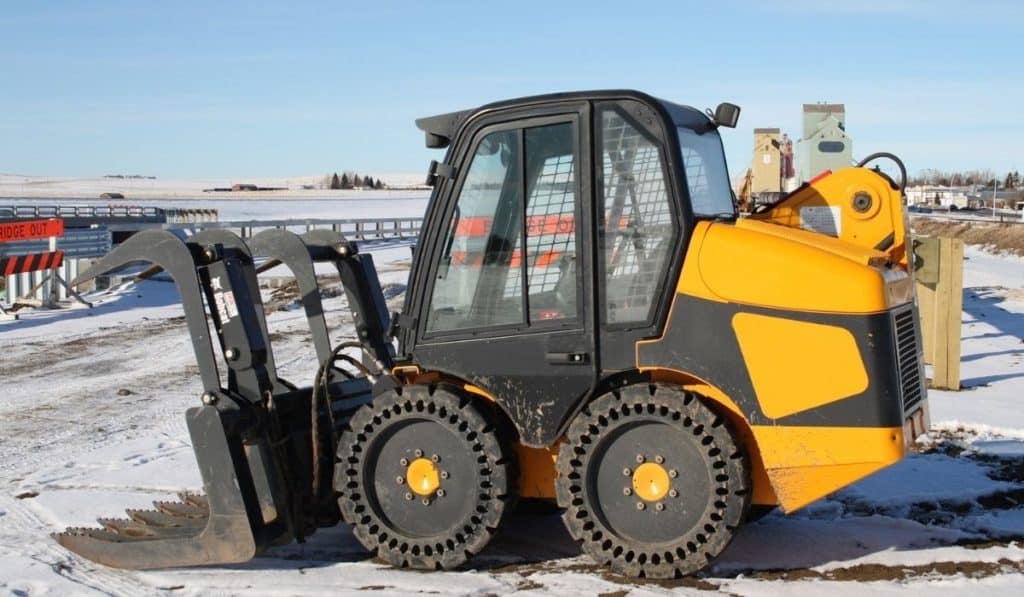
To combat this problem, you can turn to rental companies. They have a wide range of heavy equipment, and you can find machinery that will fit your project needs. Even if the project’s scope unexpectedly changes.
Additionally, renting heavy equipment gives you the benefit of finding new business opportunities.
You’re not tied to certain projects because you don’t have the equipment with the necessary features and capacity. You can simply rent what you need for each new project, no matter the size.
You can also test out different models and brands without commitment and find the right tool for the job. But if you change your mind, you can return it without added costs.
Renting comes with flexibility and more business opportunities which would be impossible if you only relied on the equipment you bought.
Less Equipment Management and Paperwork
Apart from regular maintenance, equipment management covers two additional areas: transportation and storage.
Many contractors overlook this when they buy heavy equipment because all they want is the right equipment for a project. So they often end up frustrated by added costs and logistics.
Nobody wants to expose valuable heavy equipment to weather or rent out costly storage space, so the best solution is to rent your equipment.
In this way, you can eliminate long-term storage costs if you determine the rental period upfront. Machines will be delivered at an agreed time and picked up when you don’t need them.
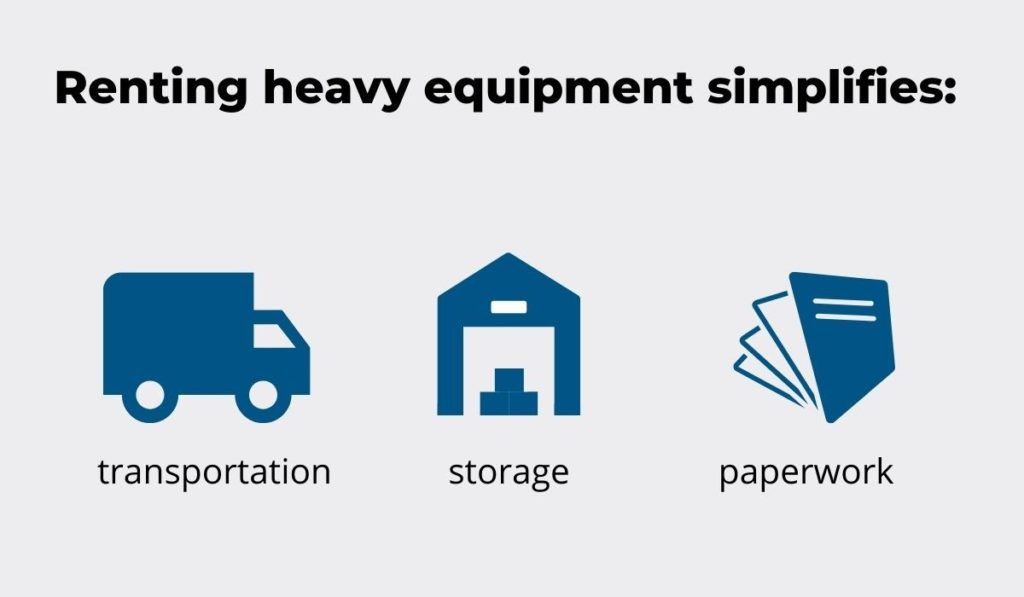
Then, moving your equipment from site to site can often become problematic. This can require extra employees to unload and offload equipment, rent additional trailers, or get permits for a wide load.
All of this means spending more money, time, and planning.
This is where renting equipment comes to the rescue once again. Most often, transportation costs are already included in your monthly payments.
So the rental company handles all transportation logistics to help you decrease project delays.
Finally, equipment management often comes with a pile of paperwork to handle. There are warranties, invoices, service reports, and insurance policies to track, which are necessary for organized construction businesses.
Yet, they also represent a long-term obligation.
With renting, all you need to keep track of are invoices. Basically, you completely eliminate additional paperwork and focus on your core business, which is delivering construction projects on time and within budget.
No Problems with Equipment Depreciation
Every time you buy a piece of heavy equipment, you need to consider depreciation costs.
Everyone knows that you’ll never be able to recover the purchase costs because as years go by, the value of the equipment drastically decreases.
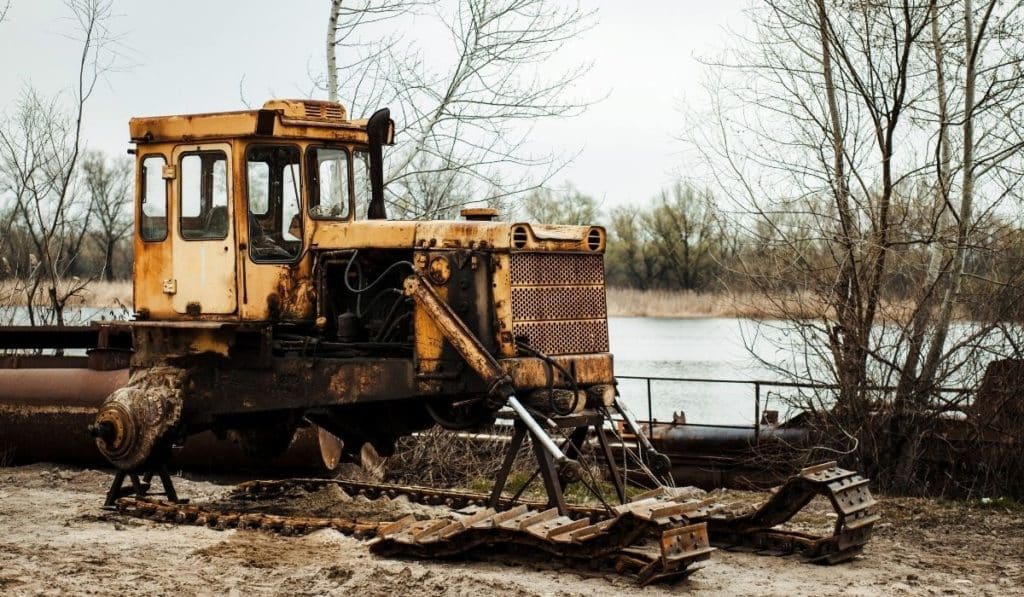
Now, if you consider renting your heavy equipment, there will be no need to worry about depreciation. Because you don’t own the equipment, you don’t need to think about resale value and maintain it in top condition to mitigate high depreciation costs.
Since your investment in the equipment is tied during the rental period, your responsibility ends once you return the machinery. So the depreciation costs are completely eliminated.
The Cons of Renting Construction Equipment
Of course, not everything is perfect, so renting also comes with several major drawbacks. These are the main reasons some contractors still don’t consider renting a viable option for their business.
Renting Equipment Can Be Expensive in the Long Term
The main appeal for renting heavy equipment is that you only pay for what you use. But this can also be a major disadvantage, especially if you need the machinery for a long time.
Short-term projects can be extremely profitable if you rent your equipment. Or, in cases where you need specialized machinery for specific projects which you’ll never use again.
But if you find yourself needing an excavator for several years, you’re better off buying one.
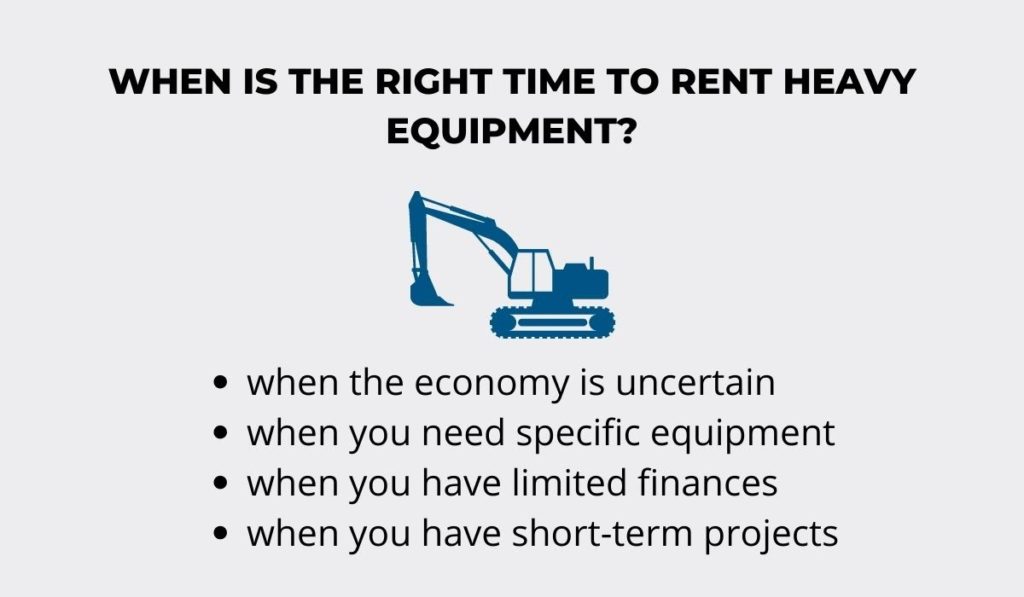
Long-term rent can quickly add up costs, and in the end, you won’t even have the machinery to cover some of the expenses. Renting equipment for a long time can sometimes exceed purchase prices for new equipment.
An additional risk with long-term rent is that you’re not going to use it for the entire renting period.
This can be due to project changes or unexpected delays, so you’re paying for machinery that’s sitting on the construction site, which you wanted to avoid in the first place.
To understand whether renting is the best option, you must calculate the project’s timeline with renting versus buying costs.
Then you can make better decisions that apply to your current financial situation and project needs.
There’s No ROI on Rented Equipment
While owning equipment comes with ownership costs, you can still recover some of the investment.
Basically, renting equipment excludes you entirely from any return on investment. All the money you spent on the machines during the rental period you can never get back.
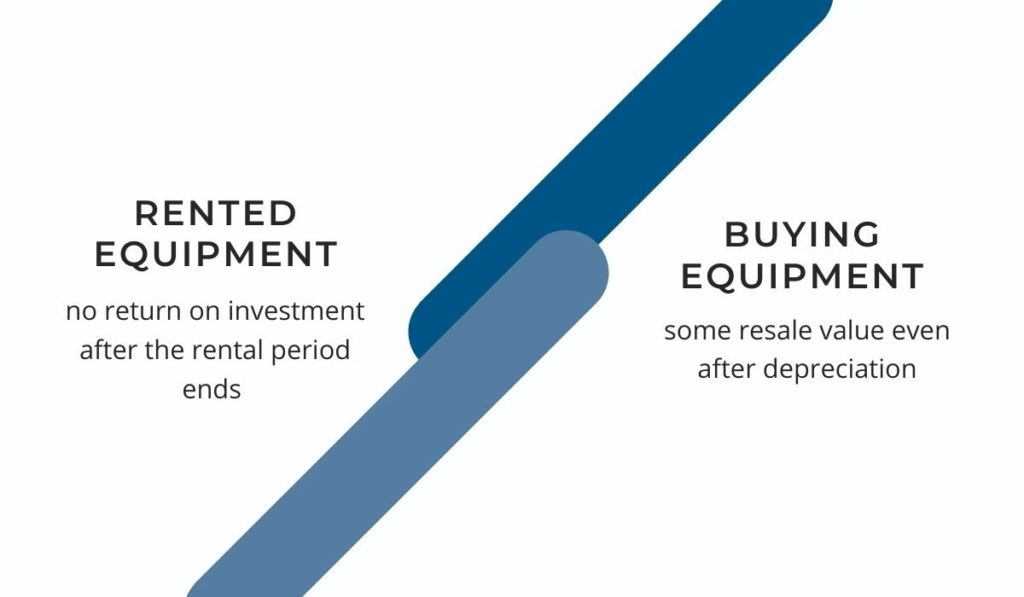
On the other hand, if you buy a piece of heavy equipment, you can count on some resale value. If you keep it in good condition, you can sell it for a good price, even with depreciation.
You won’t recover all your initial investment, but it’s more than what you’ll get if you rent your equipment.
Limited Availability and Options
The problem with wanting the latest and the best equipment is that everybody else wants it too. And rental companies have a limited number of machines.
Imagine this. You secure a fantastic project that requires heavy machinery with greater capacity than what you currently own.
The logical solution is to rent what you need. So you go to a rental company and ask for that specific machinery, and they don’t have it.
Now, you can wait for that specific model to become available, but the project schedule might not allow for large delays. You might even pay penalties for extending the project deadline.
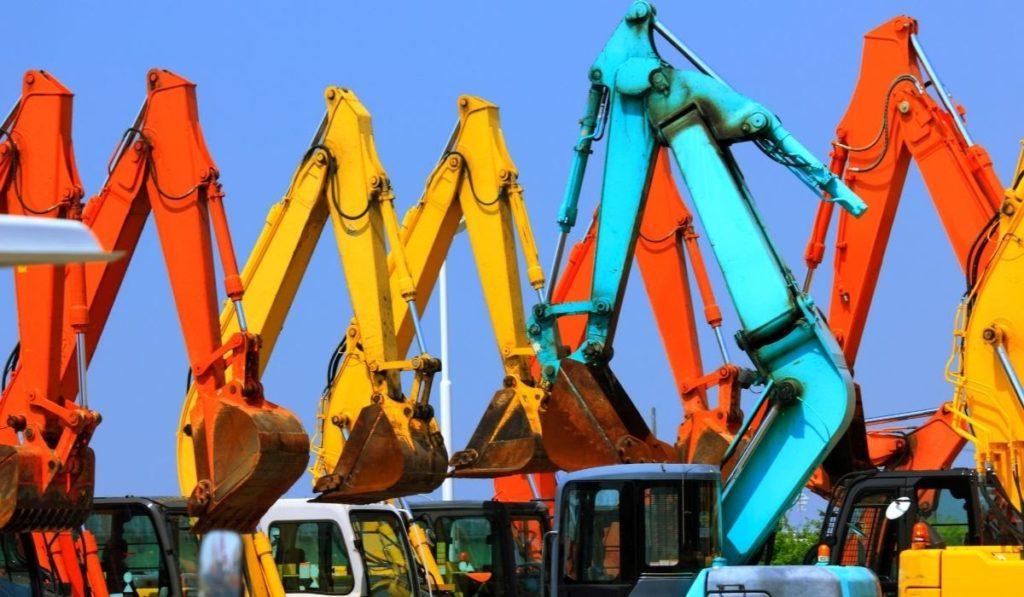
In the worst-case scenario, you’ll have to call up several rental companies and settle for an inferior model. Rental companies might have the best equipment, but they can’t have every model on the market in their inventory.
This happens more often than you think, especially in peak season. In the end, when you own the equipment, it’s available at all times, and you don’t have to worry about completing a project on time.
To sum up, you need to prepare yourself to work with rental companies’ schedules and inventory if you want the equipment you need.
Conclusion
Owning heavy equipment requires a lot of commitment.
So many contractors don’t want that responsibility or financial constraints anymore. What they need is more flexibility and protection from unexpected market downturns, so they see renting heavy equipment as their solution.
Just looking at the pros of renting can convince anyone that it’s the better alternative to buying.
There’s the flexibility to use the newest equipment that will fit different project requirements. Then, you don’t have to worry about equipment management and maintenance.
But most importantly, the costs of renting equipment are significantly lower than buying.
But, let’s not forget about the cons that might deter some contractors from renting.
You’re heavily reliant on the rental company, so when they don’t have the equipment you need when you need it, it can cause significant problems. Not to mention that long-term projects can become unprofitable if you consider long-term rental costs.
In the end, the option to rent solely depends on your company’s needs and financing options. But if you want to be competitive in the increasingly changing environment of the construction industry, then renting is your best advantage.





